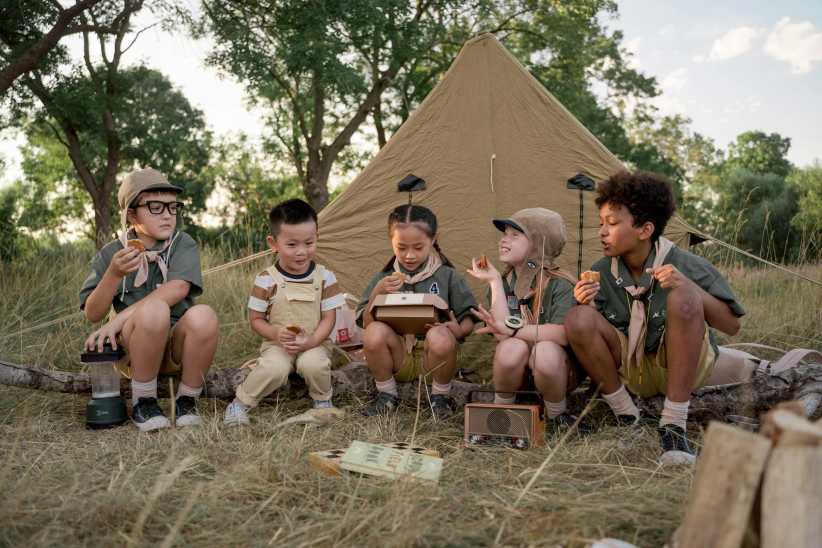You have carefully anticipated every need your child may have and every scenario that she may encounter. You’ve stuffed her bags with ointments and lotions, bandages, extra socks, mounds of Kleenex, and a stash of secret snacks. But, perhaps the most important thing you can give your child before she leaves for the great outdoors is not what you can cram into a backpack. What she needs most is…confidence! With summer fast approaching, thousands of kids will populate rural campsite communities. For many youngsters, the trip to camp is their first time away from the comforts of home – and from mom and dad. The mere anticipation of such a separation can have some children dreading the approaching send-off. Here are some ideas to help boost your child’s confidence and leave her feeling calm and capable of handling the challenges that face her:
Keep It Friendly Sasha Kukulj has been in the camp business for 12 years, as a counselor and director. He notes that parents should not be alarmed by their child’s nervousness. Such feelings, he insists, are “perfectly normal”. But he does suggest that parents quell those first day jitters by helping their kids “find a buddy”. You may want to arrange for the two happy campers to tour the grounds together, or to connect on the morning of departure. Establish a connection with staff members, too. They are there to help you both adjust to the new surroundings and are trained to make the transition to the new environment a smooth one. Ask for their help and guidance in making a successful adjustment.
Keep It Real Fear is borne of the unknown. Take the mystery out of the camp experience and let familiarity breed contentment. Simply knowing what to expect can greatly reduce any feelings of anxiety your child may have. If possible, visit the campsite a week or two ahead of time, meet with counselors and on-site administrators, tour the grounds, or sneak a peek at the facilities. If a visit isn’t possible, read and discuss the camp’s brochure and learn about their expectations and activities. Or better yet, take a “virtual tour” of the camp on their web page. Many organizations can now be accessed through websites that allow you to get a feel for the place.
Keep It Honest Bolster your child’s courage by sharing your own past experiences with camp. Reminisce fondly about the crazy antics, the food, the swimming, and the fun in the sun! Talk about friendships you made, or pen pals that became lifelong friends. It is important, however, to talk honestly about your own fears and how you dealt with them. Enlist the help of older siblings and host a roundtable discussion where the family puts to rest any fearful misconceptions of what is to come. Most importantly, share your tips for coping. Reveal how you were able to carry on, despite feelings of homesickness.
Keep It Simple When you talk to your child, let her know that if there is anything you can absolutely guarantee, it is that time passes. And, as each day progresses, the nervousness will lessen. Kukulj says that in his years of experience, most children start to feel comfortable in their new surroundings by the morning of the second day. Having gotten through their first day is a real morale booster. Imagine possible scenarios she will face in those first hours and then, together, brainstorm some ways of handling them. For example, while hiking and swimming are great fun, it’s at night that the absence of familiar surroundings is painfully felt. Come up with a plan for how she will deal with it when those inevitable feelings of homesickness begin to well up. These coping tricks needn’t be elaborate or even expensive. They are often small tokens and gestures that will provide some sorely needed comfort to sad and lonely hearts. For example, provide her with stacks of stationery or a new journal, so that she can put her feelings to paper. Or, send pictures of family, friends, or a beloved pet that she can keep tucked away for reassurance.
Keep It Light Ultimately, it’s the dialogue that will provide comfort – for both of you! While talking shop about camp is a great way to address any insecurities your child may have, listening is important, too. In the days leading up to departure, allow your child to speak openly and honestly about her fears. Indeed, some of the best chats can take place before your youngster even reaches the fireside. Above all, be positive! Keep your conversations light and hopeful, continually affirming your belief that your child’s experience at camp will be a good one. Remind her that these kinds of experiences will make her stronger and give her a taste of independence and responsibility. Let her know that you are proud of her and that you feel strongly that, not only will she overcome the challenges that face her, but that she’ll return with many wonderful tales, and maybe even a few, new friends, too!
For Parents Only What is painful for kids can be conflicting for parents. It’s hard to not jump in there and try to make it all better. Unfortunately, by doing so, you may make things worse. The following are some helpful ground rules for parents:
– Resist the urge to “baby” your baby. You and she will feel better by expecting the best from her. – If the facility does not permit visits or limits phone calls, follow the rules. – According to Kukulj, one of the worst things you can do is to linger for a long and tearful goodbye. He advises: “Drop ¡¥em off, give them a high five, and go…” – If you must pick up your “unhappy” camper early, don’t shame or scold her. Praise her for trying her best.




















